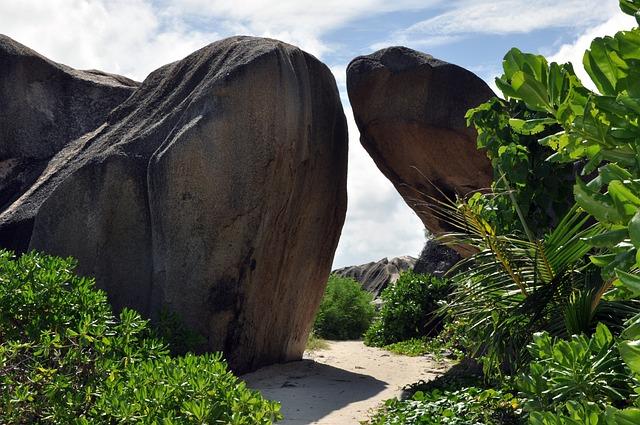The Seychelles, a picturesque archipelago renowned for its pristine beaches and vibrant marine life, is embarking on a transformative journey towards sustainable tourism. In a bold move aimed at preserving its natural heritage and promoting responsible travel, the Seychelles Tourism Department has unveiled a new policy framework in collaboration with the United Nations World Tourism Organization (UNWTO). This initiative not only seeks to enhance the visitor experience but also to safeguard the ecological integrity of the islands, ensuring that the beauty of seychelles can be enjoyed by generations to come. As global tourism faces mounting pressures from environmental concerns, this strategic policy outlines a path forward that balances economic growth with sustainability, setting a precedent for other destinations. In this article, we delve into the key components of this framework and its potential impact on the future of tourism in Seychelles.
Seychelles Embraces Sustainable Development in Tourism Strategy
The Seychelles Tourism Department has unveiled a complete policy framework aimed at fostering sustainable tourism practices across the archipelago. This forward-thinking approach prioritizes ecological conservation and the cultural integrity of the local communities, ensuring that tourism development harmonizes with the natural surroundings. Key features of the new policy include:
- Responsible Visitor education: Initiatives to inform tourists about local ecosystems and cultural customs.
- Eco-Friendly Infrastructure: Investment in green technologies and sustainable building practices.
- Community Engagement: Involving local populations in tourism planning and decision-making processes.
This sustainable tourism strategy resonates with global trends, as travelers increasingly seek experiences that are conscious of their environmental footprint.leveraging partnerships with international organizations,such as the UNWTO,the Seychelles aims to position itself as a leading figure in ecotourism. The following table outlines some of the anticipated benefits of implementing this policy:
| Benefit | Description |
|---|---|
| Environmental Protection | Preserving the unique biodiversity of the islands through responsible tourism. |
| Enhanced Visitor Experiences | Providing tourists with authentic interactions while promoting local culture. |
| Economic Growth | Supporting long-term economic stability for the local population through sustainable practices. |

Key Features of the New Policy Framework for sustainable Tourism
The new policy framework introduced by the Seychelles Tourism Department emphasizes environmental sustainability, aiming to harmonize tourism activities with the conservation of local ecosystems. Key to this initiative is the promotion of responsible tourism practices that encourage both tourists and businesses to minimize their environmental footprint.The policy outlines several strategic components, including:
- community Engagement: Involving local communities in tourism development to ensure that their needs and values are respected.
- Capacity Building: Providing training and resources for local operators to adopt sustainable practices.
- Regulation and Monitoring: Implementing measures to assess and enforce compliance with sustainability standards.
- Marketing Sustainable Tourism: Promoting Seychelles as a leading destination for eco-conscious travelers.
Moreover, an essential aspect of this framework is establishing partnerships between the government, private sector, and non-profit organizations. By fostering collaboration, the framework aims to enhance support for ecosystem-based management initiatives. Key highlights of these partnerships include:
| Partnership Type | Goals |
|---|---|
| Public-Private Partnerships | Strengthening infrastructure while preserving natural habitats. |
| Community Collaborations | Ensuring economic benefits reach local populations. |
| NGO Involvement | Implementing conservation programs and educational initiatives. |
this innovative framework not only positions Seychelles as a pioneer in sustainable tourism but also serves as a model for other nations striving to balance tourism growth with ecological preservation.

Impact of UNWTO Guidelines on Seychelles’ Tourism Sector
The guidelines set forth by the UNWTO have ushered in a transformative phase for Seychelles’ tourism sector, focusing on sustainable practices that balance ecological preservation with economic growth. According to the new policy framework, the key aspects of sustainable tourism include:
- Community Engagement: Promoting local culture and involving residents in tourism planning has become paramount.
- Environmental Conservation: Stricter measures to protect marine and terrestrial ecosystems are now in place, ensuring that biodiversity thrives alongside tourism.
- Capacity Building: Training programs for stakeholders aim to equip local operators with the skills necessary to implement sustainable practices.
Furthermore, these guidelines place a strong emphasis on responsible traveler behavior and eco-friendly practices. Responsible tourism initiatives are being developed to educate visitors on minimizing their environmental impact, thereby fostering a culture of sustainability. The following table highlights some of the anticipated outcomes from the adoption of these guidelines:
| Outcome | description |
|---|---|
| Increased Eco-Tourism | Growth in eco-friendly tours and accomodation options. |
| Enhanced Biodiversity | Improved conservation efforts leading to healthier ecosystems. |
| Community Prosperity | Economic benefits to local communities from sustainable tourism practices. |

Balancing Economic Growth and Environmental Conservation
The Seychelles Tourism Department’s commitment to sustainable practices is a crucial step toward reconciling the need for economic expansion with the imperative of environmental stewardship.Acknowledging that the archipelago‚Äôs natural beauty is its primary asset, the new policy framework emphasizes the importance of maintaining ecological balance while promoting tourism. This initiative aims to achieve sustainable economic growth by integrating eco-friendly practices into the tourism sector, ensuring that development does not come at the expense of the fragile ecosystems that attract visitors from around the globe. The underlying principle is to optimize tourism benefits while minimizing negative impacts on the environment.
To support this approach, the policy framework outlines specific strategies that will guide stakeholders in the tourism industry. These include:
- Promotion of Eco-Friendly Accommodations: Encouraging hotels and resorts to adopt sustainable practices such as renewable energy sources,waste reduction,and biodiversity conservation.
- Community Engagement: Developing programs that involve local communities in tourism management, ensuring they benefit economically and culturally from tourism activities.
- Regulation of Tourist Activities: Implementing guidelines that limit tourism-related environmental degradation,such as coastal protection measures and wildlife conservation efforts.
Moreover, the framework presents a clear vision for the future, aiming for measurable outcomes that balance visitor access with preservation efforts. The table below highlights the key objectives of this sustainable tourism policy:
| objective | Action Plan |
|---|---|
| enhance Visitor Experience | Implement immersive eco-tours and educational programs. |
| Reduce Carbon Footprint | Encourage the use of electric transportation and public transit options. |
| Support Biodiversity | Establish marine protected areas and conservation zones. |

Recommendations for Stakeholder Collaboration and Community engagement
Effective collaboration among stakeholders is crucial for the prosperous implementation of Seychelles’ new sustainable tourism policy framework. Engaging various community members, including local residents, business owners, and ecological organizations, fosters a sense of ownership and collective responsibility.To enhance collaboration, the Seychelles Tourism Department can consider the following strategies:
- Regular Stakeholder Meetings: Schedule ongoing dialogues that encourage feedback and address concerns from all parties involved.
- Community Training Programs: Develop capacity-building workshops aimed at educating local communities about sustainable practices in tourism.
- Shared Goals and Metrics: Establish common sustainability goals with clear metrics to measure progress and impact, ensuring transparency and accountability.
Community engagement can serve as a powerful tool to drive the objectives of the new policy framework forward. It is important to create platforms where local voices are heard and their insights inform decision-making. Potential approaches to enhance community involvement include:
- online Portals: Implement digital platforms where community members can post suggestions, report environmental concerns, and provide feedback on tourism practices.
- Incentive Programs: Create rewards for local businesses that adopt sustainable practices, promoting participation in the tourism sector.
- Collaborative Projects: Foster partnerships for community-led tourism activities that showcase local culture while preserving natural resources.
| Collaborative Actions | Expected Benefits |
|---|---|
| Stakeholder Meetings | Improved dialog and trust |
| Training programs | Enhanced local skills and awareness |
| Online Engagement Platforms | Increased community input and feedback |
| Incentive Programs | Encouragement for sustainable initiatives |

Future Prospects for Sustainable tourism in Seychelles
The tourism industry in Seychelles is poised for a transformative journey towards sustainability, driven by a commitment to balance ecological preservation and visitor experience. Stakeholders across the sector are increasingly recognizing the importance of adopting eco-friendly practices that not only attract responsible travelers but also protect the breathtaking natural environment.Key focus areas for achieving sustainability include:
- Community Engagement: Empowering local communities to take an active role in tourism management ensures that benefits are equitably distributed and authentic cultural experiences are showcased.
- Conservation Initiatives: Implementing programs to protect biodiversity, including marine and terrestrial areas, is fundamental to preserving the islands’ unique ecosystems.
- Renewable Energy: promoting the use of sustainable energy sources in hotels and facilities will reduce the industry’s carbon footprint and enhance energy efficiency.
- Sustainable Transport Options: Developing options for eco-friendly transportation will contribute to lowering emissions while providing visitors with authentic experiences in the stunning landscapes.
In parallel,investment in infrastructure that supports sustainability,such as waste management systems and eco-friendly accommodations,is critical for bolstering this green transition. The potential impact of these initiatives extends beyond environmental benefits; they promise to enhance Seychellois culture and lifestyle while encouraging long-term economic resilience. To visualize the projected growth of sustainable tourism, consider the following table summarizing anticipated outcomes:
| Outcome | Projected Impact by 2025 |
|---|---|
| Increase in eco-tourism revenue | +30% |
| Reduction in carbon emissions | -25% |
| Community employment in tourism | +40% |
| Visitor satisfaction rates | 90%+ |
In Retrospect
the Seychelles Tourism Department’s new policy framework, in collaboration with the UNWTO, underscores a significant commitment to sustainable tourism that aligns with global best practices. By prioritizing environmental conservation, community engagement, and responsible tourism, Seychelles positions itself not only as a prime destination for travelers seeking paradise but also as a leader in the movement towards more sustainable tourism practices. As the world continues to grapple with the impacts of climate change and over-tourism, the Seychelles model offers valuable insights into how small island nations can balance economic growth with environmental stewardship. The success of this initiative will be closely watched, serving as a potential blueprint for other destinations facing similar challenges. As Seychelles embarks on this ambitious journey, it invites the global community to join in fostering a tourism industry that cherishes and preserves its rich natural and cultural heritage for generations to come.







